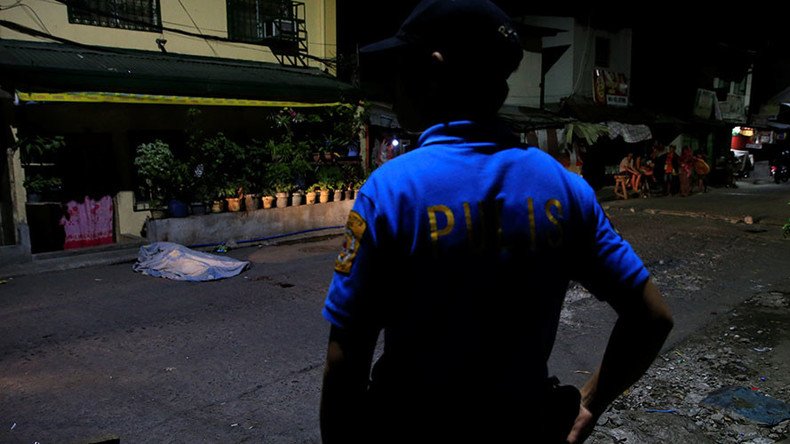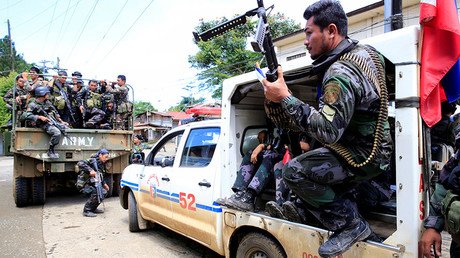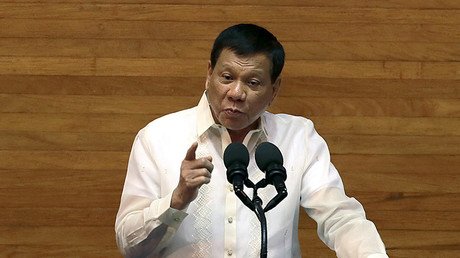Philippines’ Duterte winds down drug war to please ‘bleeding hearts & media’

President Duterte says he’ll no longer lead the crusade against drugs after suspending the Philippine National Police operations against narcotraffic earlier this week. The country’s Drug Enforcement Agency will now singlehandedly lead the ‘War on Drugs’.
On Tuesday, Duterte signed a memorandum, tasking the Philippine Drug Enforcement Agency (PDEA) to be the “sole agency” to battle illegal drugs. The order effectively suspended Oplan Double Barrel and Oplan Tokhang operations again drugs in the country, which were conducted by the Philippine National Police (PNP) for over a year. The National Bureau of Investigation was also ordered to halt its operations on drugs.
READ: PNP memo ordering the end to all anti-illegal drugs operations, including Oplan TokHang. @rapplerdotcompic.twitter.com/F8Ts16SV8y
— Rambo Talabong (@rambotalabong) October 12, 2017
Since taking office in June last year, Duterte has made tackling the drug problem in the Philippines his number-one priority.
The campaign faced heavy criticism from human rights bodies and foreign leaders as thousands of people lost their lives in drug-related killings either in the police raids or by vigilantes, business rivals and drug dealers covering up traces.
The crackdown resulted in almost 3,900 deaths, according to official police figures cited by USA Today. Human rights organizations, however, estimate that more than 8,000 people have been killed since June 2016.
On Friday, Duterte stated that he will no longer interfere in the national fight against drugs, in part because of all the negative publicity and criticism.
“I will not anymore interfere. I am not washing my hands. I just don’t want to be involved anymore,” Duterte said in an interview aired on PTV 4 on Friday. “If there are drug operations, I told police ‘Do not interfere. If you see a chase and they say it’s drugs, you leave. Let them be.’ So if somebody dies, the priests, you go to PDEA.”
Duterte apparently wants to make his ‘war on drugs’ more transparent to avoid any sort of criticism and public stain on his image. The order to withdraw the police should satisfy the “bleeding hearts and the media,” the Filipino leader said, according to the Inquirer.
While warning that PDEA may face “many grave consequences” in its fight against drugs, Duterte underlined that the new arrangement will be “appreciated by the priests, by the human rights [advocates].”
“Human rights should help the PDEA. They should go after [the drug lords],” he added sarcastically.
This is the second time Duterte ordered the suspension of the drug war. He suspended police anti-drugs operations in late January, but repealed the decision five weeks later.
Commenting on the latest development, presidential spokesperson Ernesto Abella explained that Duterte made his move to “apparently to accommodate” critics who argue that the “campaign against drugs should be conducted otherwise.”
According to the head of PDEA, the anti-narcotics campaign will now become more transparent.
“I want it to be a transparent operation. [The] media will always be invited [to] our operations. We will always wear our body cams during operations,” Aaron Aquino told the Inquirer in a text message.
At least 85 members of the Philippines’ security personnel have lost their lives in the drug war. Throughout the duration of the campaign, the security forces managed to arrest at least 1,400 high-value targets and detain over 107,000 drug abusers. Authorities also seized at least 2,465 kilograms of methamphetamine.
Despite the announced changes in the Philippines’ fight against drugs, human rights groups have received the news with caution.
“We are concerned that this too may be nothing but a short-term PR move in response to growing public outrage about the drug war’s many victims, which are overwhelmingly poor, and include children,” James Gomez, Amnesty International's director of southeast Asia and the Pacific, was quoted as saying by Philstar.
Gomez fears that the change of tactics will not have any “meaningful” impact in saving people's lives as he urged Manila to abandon “the government’s fundamental policy of supporting extrajudicial executions of drug suspects.”
“If Duterte believes that declaring another suspension in police killing operations will ease pressure for a UN-led international investigation into the drug war, he should think again,” Human Rights Watch Deputy Director for Asia, Phelim Kine, told Rappler Friday.














